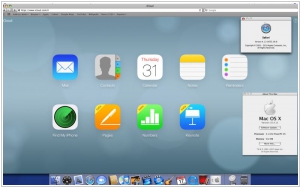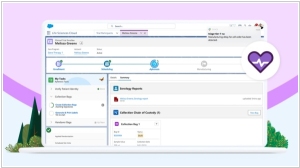Carbonite vs iCloud
August 26, 2023 | Author: Michael Stromann
17
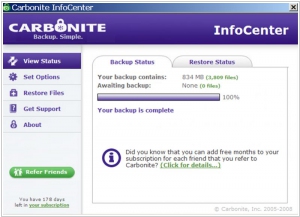
Carbonite is an online backup service, available to Windows and Mac users, that backs up documents, e-mails, music, photos, and settings. Carbonite keeps small businesses and home offices running smoothly. We offer a comprehensive suite of affordable services for data protection, recovery and anytime, anywhere accessibility. From running your small business to running your household, our goal is to provide secure and affordable cloud backup for all your files.
Carbonite and iCloud are two cloud storage services that offer users the ability to store and access their files and data remotely.
Carbonite is a backup and recovery service that specializes in automatically backing up files on a computer or device. It provides continuous and secure backups, ensuring that important files are protected from data loss or damage. Carbonite offers features like unlimited storage, file versioning, and the ability to access files from any device with an internet connection. It also includes additional features such as remote file access and the ability to remotely wipe data in case of device loss or theft.
On the other hand, iCloud is a cloud storage and synchronization service provided by Apple. It is designed primarily for Apple devices and seamlessly integrates with macOS, iOS, and iPadOS. iCloud offers storage space for various types of content, including photos, videos, documents, and device backups. It provides automatic synchronization across all Apple devices, allowing users to access their files and data from different devices seamlessly. iCloud also includes features such as file sharing, collaboration, and syncing of settings, contacts, calendars, and more.
While both Carbonite and iCloud offer cloud storage solutions, they have distinct focuses and target different user needs. Carbonite emphasizes data backup and recovery, prioritizing file protection and security. On the other hand, iCloud is tightly integrated with the Apple ecosystem, providing seamless synchronization and accessibility across Apple devices.
See also: Top 10 Online Backup services
Carbonite is a backup and recovery service that specializes in automatically backing up files on a computer or device. It provides continuous and secure backups, ensuring that important files are protected from data loss or damage. Carbonite offers features like unlimited storage, file versioning, and the ability to access files from any device with an internet connection. It also includes additional features such as remote file access and the ability to remotely wipe data in case of device loss or theft.
On the other hand, iCloud is a cloud storage and synchronization service provided by Apple. It is designed primarily for Apple devices and seamlessly integrates with macOS, iOS, and iPadOS. iCloud offers storage space for various types of content, including photos, videos, documents, and device backups. It provides automatic synchronization across all Apple devices, allowing users to access their files and data from different devices seamlessly. iCloud also includes features such as file sharing, collaboration, and syncing of settings, contacts, calendars, and more.
While both Carbonite and iCloud offer cloud storage solutions, they have distinct focuses and target different user needs. Carbonite emphasizes data backup and recovery, prioritizing file protection and security. On the other hand, iCloud is tightly integrated with the Apple ecosystem, providing seamless synchronization and accessibility across Apple devices.
See also: Top 10 Online Backup services
Carbonite vs iCloud in our news:
2023. Apple revamps iCloud.com with more features for drive, mail and notes
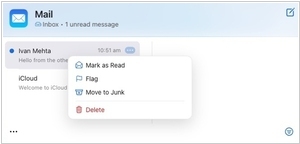
Apple has introduced a revamped version of iCloud.com, enhancing its functionality for PC users. The redesigned website offers support for browser notifications for Mail and Calendar, allowing users to receive alerts directly on their PCs. Additionally, the homepage is now customizable, enabling users to take quick actions like downloading files, deleting emails, marking tasks as unread, and more. This update builds upon last year's redesign, which included quick-glance widgets for apps like Notes and Pages. Furthermore, iCloud.com now enables users to insert links from one note into another, akin to iOS 17, enhancing the overall user experience and productivity on the platform.
2019. OpenText buys online backup firm Carbonite for $1.42B
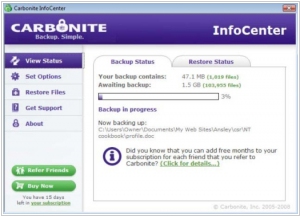
Carbonite, a company specializing in data backup, has recently entered into a purchase agreement with OpenText, a prominent enterprise information management firm, for a substantial amount of $1.42 billion. In recent years, Carbonite has transitioned from its traditional data backup focus to becoming a proactive and defensive security company. To strengthen its security offerings and defend against emerging threats such as ransomware, Carbonite made strategic acquisitions. In February, the company acquired endpoint security firm Webroot for $618.5 million in an all-cash transaction. Just a year prior, Carbonite purchased cloud backup service Mozy for $145 million. These acquisitions have contributed to Carbonite's evolution and expansion into the security domain.
2014. Apple iCloud to get folders with files, Windows app
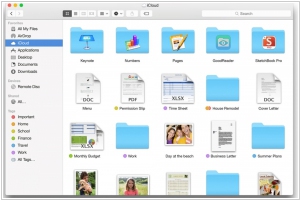
Cloud file storage and sync service iCloud is not well-received among Apple enthusiasts for several reasons. Firstly, it exclusively syncs internal app files, preventing users from accessing them outside these apps. Secondly, its pricing is considered expensive ($20 for 20GB), making it a luxury only affordable for Dropbox. Thirdly, it solely functions on Apple devices, even frustrating Apple fanatics who desire more openness. To address these concerns, Apple has introduced an update to the service, now known as iCloud Drive. This revamped version operates similarly to Dropbox, allowing synchronization of any folders with any files. Additionally, it will offer a client for Windows in addition to the existing Mac and iOS apps. Furthermore, Apple has reduced the pricing, starting from $0.99 per month for 20 GB, and a free storage tier of 5 GB will also be available. These improvements are slated to launch in the upcoming fall alongside the release of the new iOS 8 and OSX Yosemite.
2013. Apple launches iWork for iCloud
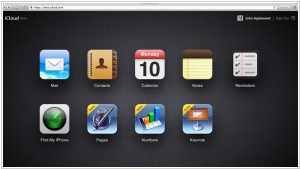
In terms of business applications, Apple has historically shown less interest, but it recognizes the significance of Office as an essential component of its platform. Competitors such as Microsoft and Google have taken significant strides in this area, surpassing Apple. To address this, Apple made a move to rectify the main drawback of its office suite, which was the absence of an online version. During the WWDC conference in June, Apple officially unveiled iWork for iCloud, making the online applications Pages, Numbers, and Keynote accessible to all through iCloud online accounts (currently in beta). However, these editors currently have limitations that may only appeal to users of MS Office and Google Docs. For instance, the text editor Pages lacks the ability to add tables, and spell check functions are only available in English. Collaboration tools are also absent. On a positive note, users can upload and edit MS Word, Excel, and PowerPoint documents, with formatting being preserved in some cases. Additionally, documents can be downloaded in MS Office formats and PDF.
2011. Apple iCloud delighted SaaS vendors

As you may be aware, on Monday, Steve Jobs once again took the stage to unveil another groundbreaking innovation. This time, however, the focus shifted from small metallic devices to something larger and virtual: iCloud - the new cornerstone of Apple's strategy. From an enterprise perspective, iCloud may not be particularly captivating. Its primary function is to synchronize content and applications across all Apple devices (iPad, iPhone, Mac), thereby enhancing personal productivity. Nevertheless, the advent of iCloud has garnered enthusiastic responses from SaaS vendors such as Box.net, Zoho, and Salesforce. These vendors appear content that iCloud does not pose direct competition, as it exclusively caters to Apple devices and lacks collaborative features. However, iCloud's significance lies in the broader shift from desktop-centric computing to the Cloud, as emphasized by Steve Jobs himself. When Jobs asserts that the center of computing is no longer confined to the iPhone or iPad but resides in the cloud, people believe it, including those in the enterprise realm.

